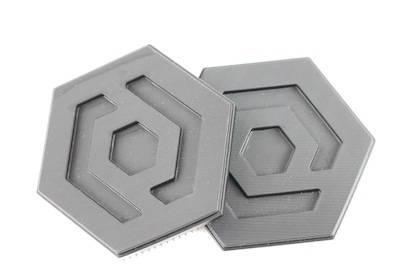Ford turns to additive manufacturing for replacement, niche parts
The automaker has tied up with Carbon to expand collaboration to digitally manufacture new durable, end-use parts. It has also scored success with electric bus manufacturer Proterra in the production of low volume parts.
January 17, 2019

Carbon, a leading Silicon Valley-based digital manufacturing company, today showed the first digitally manufactured polymer parts in production for Ford Motor Company. The parts include Ford Focus HVAC (heating, ventilation and cooling) lever arm service parts, Ford F-150 Raptor auxiliary plugs for a niche market, and Ford Mustang GT500 electric parking brake brackets. The companies jointly presented the applications today at the Additive Manufacturing for Automotive Workshop at the 2019 North American International Auto Show (NAIAS) in Detroit.
Carbon and Ford, which recently announced the opening of its Advanced Manufacturing Center in Redford, Michigan, have expanded their collaboration to design and produce several new digitally manufactured, end-use parts using Carbon’s robust and reliable printers, proprietary Digital Light Synthesis technology, and innovative EPX (epoxy) 82 material. Carbon’s durable EPX 82 material proved ideal for these parts, passing Ford’s rigorous performance standards and withstanding critical requirements such as interior weathering; short- and long-term heat exposures; UV stability; fluid and chemical resistance; flammability (ISO 3795); and fogging (SAEJ1756) for the selected applications.
“We are thrilled to be collaborating with Ford Motor Company and are excited about the many opportunities to leverage the power of digital manufacturing to deliver durable, end-use parts with similar – or better – properties as injection molded parts,” said Joseph DeSimone, CEO and Co-founder of Carbon. “The automotive industry shows significant promise for using digital fabrication at scale, and our work with Ford is a perfect example of the kind of innovation you can achieve when you design on the means of production.”
|
Ergonomically designed, dual-purpose handle leveraging the design freedom offered by Carbon’s additive manufacturing technology. |
|
Dash plates fabricated with Carbon’s additive manufacturing technology cost $32 each. |
Digital Light Synthesis technology, enabled by Carbon’s proprietary CLIP process, is a technology that uses digital light projection, oxygen permeable optics, and programmable liquid resins to produce parts with excellent mechanical properties, resolution, and surface finish. CLIP is a photochemical process that carefully balances light and oxygen to rapidly produce parts. It works by projecting light through an oxygen-permeable window into a reservoir of UV-curable resin. As a sequence of UV images are projected, the part solidifies and the build platform rises.
Through partnerships with companies that also include adidas, Johnson & Johnson, and Vitamix, Carbon is moving beyond 3D printing to full-scale digital manufacturing by helping customers create break-through products across industry sectors, from automotive to healthcare to consumer goods. In November, Carbon announced radical price reductions for its most widely used resins, further expanding the addressable market for large-scale digitally manufactured parts.
This is not the first time Carbon is working in the transportation sector. Battery-powered bus builder Proterra has used Carbon’s additive manufacturing technology to serve the requirements of transit agency customers across the US that require unique vehicle configurations to serve local requirements. Order sizes for each customer vary, typically ranging from two to 25 vehicles per order, depending on the customer’s vehicle replacement schedule.
An average Proterra vehicle has about four thousand different parts, each of which can require different materials and manufacturing methods. A sizeable portion of these parts are injection-molded plastic parts and managing thousands of these parts through their entire lifecycle is an enormous task.
The economic model of the commonly-used injection-molding (IM) manufacturing method breaks down when the quantity of end-production parts needed is small. The typical injection-mold development and tooling cost can be anywhere between $25,000 and $50,000 for low-to-medium complexity small parts and between $100,000 and $400,000 for more complex larger parts. For example, if one customer orders only 10 buses, the estimated cost for a medium-complexity, injection-molded part unique to that customer can be as high as $5,000 (=$50,000/10) each. This is one of the most critical challenges for organizations everywhere that require high-quality, low-volume production parts.
To meet this challenge, Proterra decided to manufacture two production parts using Carbon’s M Series 3D printers with rigid, lightweight polyurethane (RPU) material. One is an ergonomically designed, dual-purpose handle. Leveraging the design freedom offered by Carbon’s technology, engineers at Proterra and Carbon collaborated to iterate on the handle design and added a digital texture for better grip. The part now serves a dual purpose as a door switch handle and a functional tool to open access panels. In all, 10 part were produced. The part’s cost was $22.50 versus the $25,000 it would have taken to build an injection molding tool.
The second part is a large customized dash plate with a Proterra logo produced using the Carbon M2 printer and RPU material. This is comprised of two individual parts: a large dash plate and the Proterra logo inset. The dash plate dimensions are 318 mm (L) x 110 mm (W) x 40 mm (H).
Making such a large, complex part with injection molding typically involves months of Moldflow flow analysis and draft angle analysis, followed by several months of tool development. Proterra engineer Trey Underwood observed that “the final Carbon part looked better than any injection-molded part I have previously seen for comparable dash plates.” Proterra also manufactured 1o of the parts a cost of $32 per part versus the $50.000 cost of fabricating an injection molding tool.
About the Author(s)
You May Also Like






